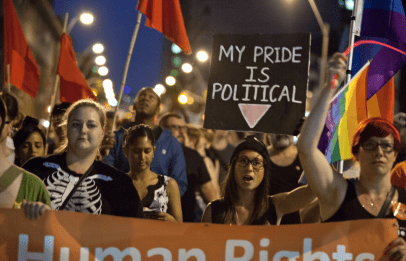Pride began as a political statement. And a small group of activists who marched through Toronto on the evening of June 22, 2015 wants to make sure those roots aren’t forgotten.
The fourth annual Night March wound its way through the streets of the downtown core as rain fell intermittently. A drumline kept spirits high, as protesters chanted, “Whose streets? Our streets!”

Kim Koyama was at the first Night March in 2012. “There must have been 400 people in Nathan Phillips Square,” Koyama says, recalling how the march went all the way to the Church-Wellesley Village before police even realized there was an event happening.
“[It’s] just a reaction to all the corporatism in Pride, and taking it back to the roots.”
The very first Pride marches were the direct results of aggressive resistance to oppression. In New York City in 1961, members of the trans community were at the centre of the Stonewall Riots, which took place after the Stonewall Inn, a popular LGBT bar in Greenwich Village, was raided by police. In Toronto, the first Pride march was organized in protest of the bathhouse raids in 1981.

Night March aims to keep that sentiment alive. Organizers purposely march at night and, unlike the officially sanctioned Pride Toronto marches, hold it without permits.
They also don’t tell marchers where they are headed. As the protesters left their gathering point at George Hislop Park, they made their way into the Village, where passersby stopped to watch; some appreciatively clapped along with the drummers.
It was the first time Scott White, who lives near the Village, had seen the Night March. But he doesn’t necessarily disagree with corporate involvement in Pride. “I think that’s a good thing,” he says, noting that it builds awareness in the community.
However, Maddy Eddy, another Pride reveler, thinks the Night March is an important part of Pride week, officially or not. “It’s bringing awareness,” she says, “We’re humans, we all deserve equal rights.”

As the parade marched out of the Village, down Carlton Street, and then turned south on Yonge Street, onlookers stopped and stared, some whipping out camera phones to take quick pictures. One man walking by gave the march a thumbs down.
Casey Oraa, the organizer of this year’s march and two past marches, says that they do sometimes confront homophobia or other strange incidents on the route. “When you do a march like this, you kind of get it right in your face,” he says, noting that unlike the Pride parade, there are no barriers separating the marchers from the public.
This year, as the march ended in Yonge and Dundas Square, Oraa found himself dealing with a member of the public who wanted to jump on the megaphone and explain why he disagreed with the march — the same person later told Oraa why he felt it was wrong for men to be women and vice versa.

There was also an arrest near the march, leading to a flurry of concern that some of the protesters had been involved. When it was finally clear they were not, Oraa was able to relax.
But it reinforces the need for the Night March in the first place. “I think it’s still very relevant,” he says. “You just need to look at the issues affecting our communities and how people are disproportionately affected.”
“A lot of people still believe there is a need to have a very politicized Pride and a politicized queer presence.”
Activist Susan Gapka says the march is important to her because of that political nature.
“You’ve got to love it: without permits, free speech — just taking over the streets because these are our streets.”
(Photos: Nick Lachance)


 Why you can trust Xtra
Why you can trust Xtra


